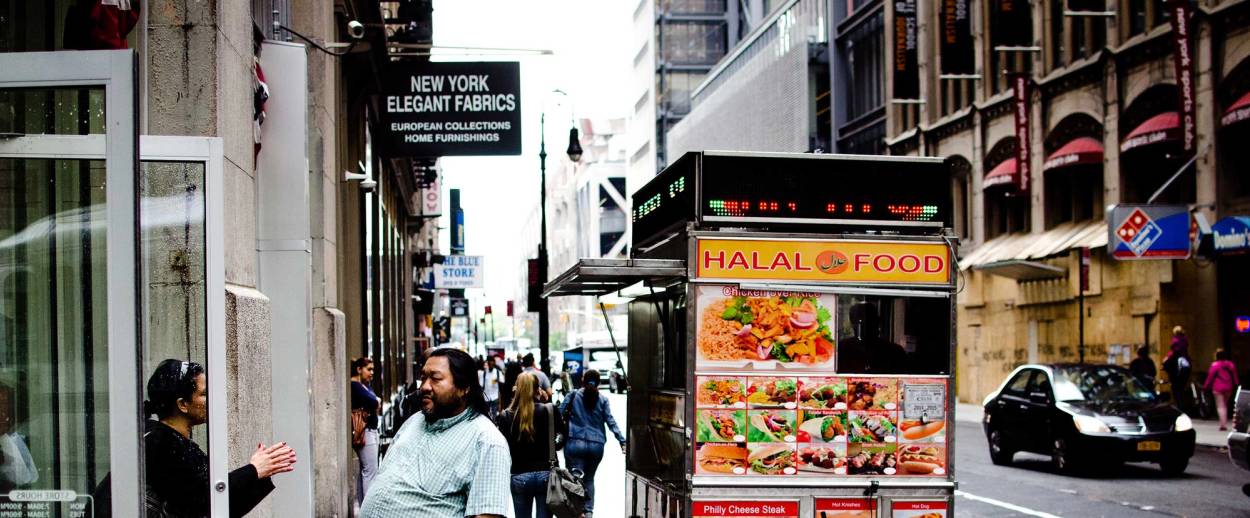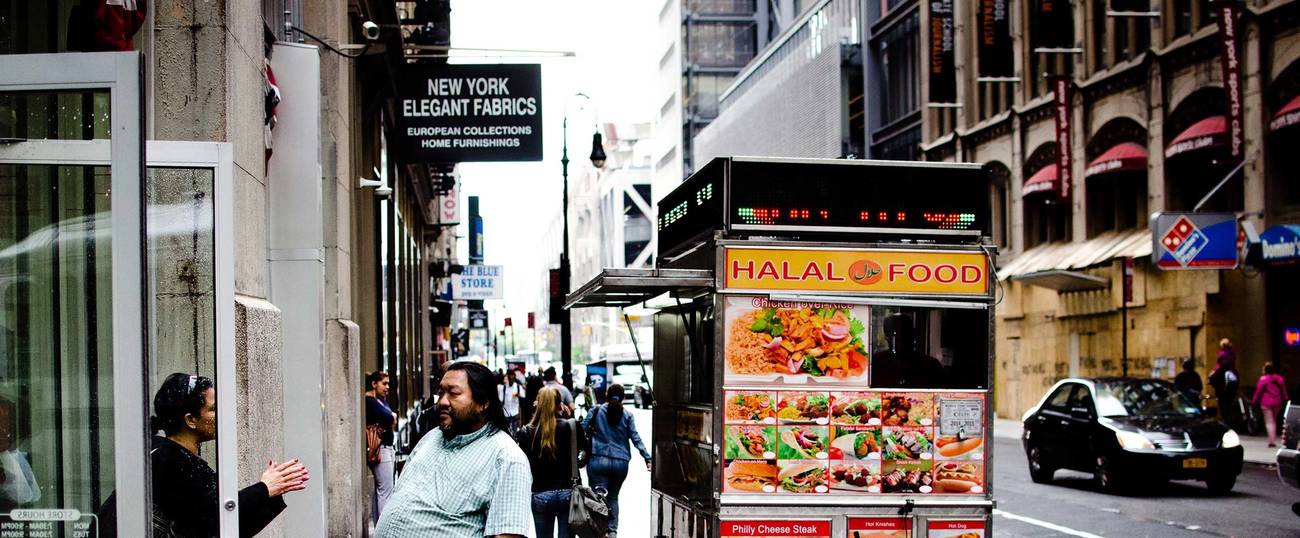Healing the World, One Halal Cart at a Time
This Tisha B’Av, I tried a new tradition: buying strangers lunch




Tisha B’Av this year hit a bit too close to home. Sitting on the floor, in the dark, and chanting the book of Eicha, or Lamentations, with my congregation, all I could think was: Great, another tale of a town in flames, careening toward ruin. As if living in New York, where the subway system these days is seemingly powered by a pair of arthritic mules, wasn’t enough. As if we don’t get enough sina’at chinam, or baseless hatred, from Fox News and CNN. Have we reached the point where an account of mothers cooking and eating their own children is what’s needed to make sense of the ISIS-type horrors of our own day?
A great rabbi, though, is blessed with the gift of being able to shepherd even the grumpiest and most obdurate of his flock, and so when Rabbi David Ingber delivered his sermon, I grudgingly listened. His drash was as moving and eloquent as always, but it was one simple proposition he shared that continued to haunt me as I stumbled home. It was this: Tomorrow, Rabbi Ingber told us, consider starting a new Tisha B’Av tradition. Fight sina’at chinam with ahavat chinam, or baseless love. Take the money you would’ve spent on lunch and buy someone a cup of coffee, for no reason. Don’t cling to the pieties of observance; strive instead to introduce unexpected kindness.
Was he on to something? At first, my bad temper shrieked and insisted that the whole speech was just hokum. With all the problems mounting in the world, with all the evil howling everywhere, what difference could a small act of charity make? Shouldn’t we be focusing instead on forging systemic solutions to our colossal problems? Shouldn’t we steel ourselves and stand strong? But though we have our considerable differences, theological and political alike, I admire my rabbi, and I went to bed on Erev Tisha B’av resolved to give his idea a try.
The next morning, on my way to the Tablet office, I stopped at the Halal cart on the corner of Broadway. It caters to a very different clientele than the airy, overpriced chain restaurants that surround it: While smartly dressed and affluent young men and women line up outside Dig Inn, Sweetgreen, and the new matcha tea temple down the block, the Halal cart serves cabbies on a quick lunch break, construction workers sweating in the sun, or garage attendants who carry the white Styrofoam containers with them as they head back down underground to breathe in exhaust fumes and dust. The cart’s owner was preparing for the day ahead, chopping onions and meat.
Feeling a bit silly, I approached him and shared some truncated version of Rabbi David’s sermon. Today, I told the man, was a Jewish holiday—well, more of a day of mourning, really—and what we commemorate is the destruction of the Temple, which we believed happened in large part because we couldn’t get along and spent all our time and energy fighting with each other. The Halal cart owner nodded in solemn understanding. Anyway, I continued, at synagogue the other day the rabbi suggested that maybe the best way to observe this historical catastrophe is to do the opposite, and just be kind for no reason. And with that, I handed the man a $20 bill.
“How much is lunch here?” I asked.
“With everything?” the man responded.
“With everything.”
“Six dollars.”
“Then please,” I said, “give the first three people who come up today a free lunch.”
The man stopped to think this over.
“Today’s a Jewish holiday?” he asked again, still trying to work it out.
“Yes,” I replied. “And we have to fast. But the larger point, I think, is to try and fix this business of hating each other for no reason. I don’t really know how to do that, but maybe buying some people chicken and rice is a good first step.”
The man smiled.
“You know what?” he said. “The first three people get a free lunch on you. The next three people get a free lunch on me.”
We both smiled widely. We shook hands, and we meant it. I said, “Alhamdullillah.” He said, “Shalom.” I walked back to the office. Beneath my feet, the subway system was still irreparably broken. Around me, the same crises lurked. Somewhere in the distance, evil men steeped in darkness planned fresh slaughters. My small act of charity changed none of that. But it achieved something no less monumental—it gave two New Yorkers, a Jew and a Muslim, a moment to share, a moment of joy and of hope. It opened, if only for a few fleeting minutes, a path to healing.
I’m no rabbi, but I can’t think of a better way to serve God.
***
Like this article? Sign up for our Daily Digest to get Tablet Magazine’s new content in your inbox each morning.
Liel Leibovitz is editor-at-large for Tablet Magazine and a host of its weekly culture podcast Unorthodox and daily Talmud podcast Take One. He is the editor of Zionism: The Tablet Guide.